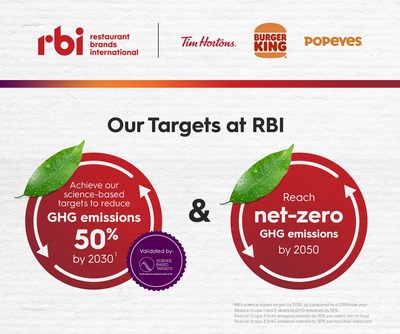New Targets Intend to Achieve Business Growth Without Emissions Growth
TORONTO, Sept. 22, 2021 /PRNewswire/ - Today, Restaurant Brands International (TSX: QSR) (NYSE: QSR) (TSX: QSP) ("RBI"), parent company of Burger King®, Tim Hortons®, and Popeyes® brands, announced new commitments to help address climate change. RBI will collaborate with franchisees and suppliers to pursue science-based targets (SBTs) for reducing greenhouse gas (GHG) emissions by 50% by 2030. These targets were approved by the Science Based Targets initiative (SBTi) and based on the SBTi Criteria and Recommendations. In addition, RBI has set a target to achieve net-zero emissions by 2050 or sooner. The goals are part of the company's broader Restaurant Brands for Goodstrategy and seek to achieve business growth without emissions growth.

"As one of the largest quick service restaurant companies in the world, we have a critical role to play in addressing the threat of global climate change, which is important for our planet and for our guests," said José E. Cil, Chief Executive Officer of RBI. "We've done the hard work to determine where we stand, where we can make the most meaningful impact, and the actions we need to take to move the needle. With these ambitious targets, we are accelerating our efforts to promote a more sustainable future and continue on our journey to build the most loved restaurant brands in the world."
RBI's GHG Emissions Targets
- SBTs: Compared to a 2019 base year, by 2030, RBI aims to reduce:
- Absolute Scope 1 and 2 GHG emissions by 50%
- Scope 3 GHG emissions intensity by 50% per metric ton of food
- Scope 3 GHG emissions intensity by 50% per franchise restaurant
- Net-Zero: RBI also aims to reach net-zero emissions by 2050
Anticipated Impact
Though there is much work ahead, the potential impact is compelling: achieving these targets would prevent an estimated 25.4 million metric tons of carbon dioxide equivalent (CO2e) emissions from being released into the atmosphere by 2030 as compared to a business-as-usual scenario. Preventing this amount of GHG emissions is comparable to taking 5.5 million passenger cars off the road in the United States for an entire year – or the total number of household vehicles in Los Angeles, Chicago, and New York City combined, according to calculations based on 2021 data from the U.S. EPA and the latest available U.S. census data.
"We congratulate RBI on setting targets consistent with limiting warming to 1.5°C, the most ambitious goal of the Paris Agreement," said Alberto Carrillo Pineda, Executive Director, Science Based Targets at CDP, one of the Science Based Targets initiative partners. "By setting ambitious targets grounded in climate science, RBI is taking action to help reduce the effects of climate change."
The company's roadmap for achieving its targets builds on progress promoting leading environmental stewardship practices already underway in the agricultural supply chain, in partnership with suppliers, researchers, farmers and ranchers. The roadmap also details several new milestones for the future and includes initiatives such as using renewable energy in operations, implementing energy efficient equipment, and converting to electric vehicle use.
In making these commitments, RBI joins the Race to Zero and becomes a signatory to the Business Ambition for 1.5°C Campaign, a call to action from a global coalition of UN leaders, businesses, and NGOs urging companies to commit to set ambitious science-based emissions reduction targets, aligned with limiting global warming to 1.5°C.
The Science Based Targets initiative is a collaboration between CDP, the United Nations Global Compact, World Resources Institute (WRI) and the World Wildlife Fund for Nature (WWF).
For further information: about RBI's Restaurant Brands for Good strategy, visit www.rbi.com/sustainability.
About Restaurant Brands International
Restaurant Brands International Inc. ("RBI") is one of the world's largest quick service restaurant companies with approximately $33 billion in annual system-wide sales and over 27,000 restaurants in more than 100 countries. RBI owns three of the world's most prominent and iconic quick service restaurant brands – TIM HORTONS®, BURGER KING®, and POPEYES®. These independently operated brands have been serving their respective guests, franchisees and communities for over 45 years.
Forward-Looking Statements
This press release contains certain forward-looking statements and information, which reflect management's current beliefs and expectations regarding future events and performance and speak only as of the date hereof. These forward-looking statements are not guarantees of future performance and involve a number of risks and uncertainties. These forward-looking statements include statements about our sustainability goals and our expectations regarding achieving them. The factors that could cause actual results to differ materially from RBI's expectations are detailed in filings of RBI with the Securities and Exchange Commission and applicable Canadian securities regulatory authorities, such as its annual and quarterly reports and current reports on Form 8-K, and include the following: risks related to unforeseen events such as pandemics; risks related to supply chain; risks related to our franchise business model; risks related to RBI's ability to successfully implement its domestic and international growth strategy and risks related to its international operations; risks related to RBI's ability to compete domestically and internationally in an intensely competitive industry; risks related to technology; and changes in applicable laws or interpretations thereof. Other than as required under U.S. federal securities laws or Canadian securities laws, we do not assume a duty to update these forward-looking statements, whether as a result of new information, subsequent events or circumstances, change in expectations or otherwise.
 View original content to download multimedia:https://www.prnewswire.com/news-releases/restaurant-brands-international-sets-science-based-targets-to-reduce-greenhouse-gas-emissions-50-by-2030-and-plans-to-reach-net-zero-by-2050-301382729.html
View original content to download multimedia:https://www.prnewswire.com/news-releases/restaurant-brands-international-sets-science-based-targets-to-reduce-greenhouse-gas-emissions-50-by-2030-and-plans-to-reach-net-zero-by-2050-301382729.html
SOURCE Restaurant Brands International Inc.
